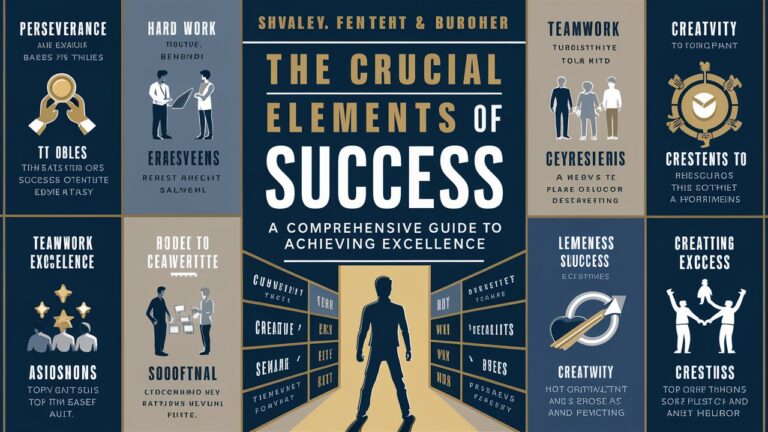Introduction
In a world driven by rapid change and fierce competition, understanding the crucial elements that underpin success is more vital than ever. Whether in business, personal growth, or creative pursuits, certain principles stand out as non-negotiable pillars of achievement. This article dives deep into the crucial components that define excellence, offering actionable insights and long-term strategies. From foundational habits to advanced frameworks, we’ll explore how these elements interconnect to create sustainable progress. By the end, you’ll have a roadmap to identify, prioritize, and master the crucial factors that elevate outcomes from ordinary to extraordinary.
1. Strategic Planning: The Crucial Foundation of Every Endeavor
Strategic planning is the bedrock of success. Without a clear roadmap, even the most ambitious goals risk becoming fragmented or unattainable. A crucial aspect of strategic planning involves defining measurable objectives, allocating resources wisely, and anticipating challenges. For instance, businesses that thrive in volatile markets often employ SWOT analysis (assessing Strengths, Weaknesses, Opportunities, and Threats) to stay ahead. On a personal level, setting SMART goals (Specific, Measurable, Achievable, Relevant, Time-bound) ensures accountability. The crucial takeaway? Clarity in planning eliminates ambiguity, enabling focused execution.
2. Effective Communication: A Crucial Bridge Between Vision and Reality
No strategy succeeds without effective communication. This crucial skill fosters collaboration, resolves conflicts, and aligns teams with a shared purpose. Consider leaders who inspire action—they articulate their vision with precision, listen actively, and adapt their messaging to diverse audiences. In remote work environments, where misunderstandings are common, overcommunication becomes crucial. Tools like regular check-ins, transparent feedback loops, and collaborative platforms bridge gaps. Remember, communication isn’t just about speaking; it’s about ensuring your message is understood and acted upon.
3. Continuous Learning: The Crucial Engine of Innovation
In an era of technological disruption, stagnation is a recipe for obsolescence. Continuous learning stands out as a crucial driver of adaptability and innovation. Industries like AI and healthcare evolve daily, demanding professionals to upskill relentlessly. Organizations that prioritize learning cultures—through workshops, mentorship, or access to online courses—retain top talent and stay competitive. On an individual level, dedicating time to read, experiment, and reflect fosters intellectual agility. The crucial lesson? Knowledge isn’t static; it’s a dynamic asset that must be nurtured.
4. Resilience and Adaptability: Crucial Traits for Navigating Uncertainty
Resilience and adaptability are crucial in overcoming setbacks and thriving in uncertainty. Consider startups that pivot their business models during crises or individuals who rebound from failures stronger than before. Resilience involves emotional fortitude—accepting setbacks as temporary and actionable. Adaptability, meanwhile, requires flexibility in strategy. For example, companies like Netflix transitioned from DVD rentals to streaming, showcasing adaptability’s crucial role. Cultivating these traits involves embracing discomfort, practicing mindfulness, and viewing change as an opportunity.
5. Ethical Leadership: A Crucial Pillar of Sustainable Success
Leadership devoid of ethics erodes trust and undermines long-term success. Ethical leadership is crucial for fostering loyalty, accountability, and a positive organizational culture. Leaders who prioritize transparency, fairness, and social responsibility inspire teams to align with broader missions. Take Patagonia’s commitment to environmental sustainability—its ethical stance not only attracts customers but also galvanizes employees. The crucial insight here is that true leadership isn’t about authority; it’s about serving as a role model for values-driven action.
6. Consistency: The Crucial Catalyst for Long-Term Impact
While bursts of effort yield short-term wins, consistency is crucial for lasting impact. Athletes, artists, and entrepreneurs alike attribute their success to daily discipline, not sporadic brilliance. James Clear’s Atomic Habits emphasizes that small, repeated actions compound into extraordinary results. For businesses, consistent branding and customer service build trust. On a personal level, routines like journaling or exercise create momentum. The crucial truth? Mastery is a marathon, not a sprint.
Conclusion
The journey to excellence hinges on recognizing and mastering crucial elements that transcend industries and personal aspirations. From strategic planning to ethical leadership, each component interlinks to form a robust framework for success. While challenges will arise, anchoring efforts in these principles ensures resilience and growth. Remember, greatness isn’t accidental—it’s intentional. By prioritizing what’s crucial, you empower yourself to navigate complexity, inspire others, and leave a lasting legacy.
Frequently Asked Questions (FAQs)
Q1: Why are these elements considered “crucial”?
These elements are foundational—they address universal challenges like uncertainty, communication gaps, and stagnation. Ignoring them often leads to fragmented results, while mastering them creates synergy and sustainability.
Q2: How can I improve adaptability in a rigid work environment?
Start small: Advocate for pilot projects, seek cross-functional training, and frame adaptability as a problem-solving asset. Lead by example to gradually shift organizational culture.
Q3: Is ethical leadership relevant for small businesses or solo entrepreneurs?
Absolutely. Ethics build credibility and customer loyalty, regardless of scale. Even solo ventures benefit from transparent practices and social responsibility.
Q4: Can consistency hinder creativity?
No. Consistency in processes (e.g., dedicating time to create) actually fuels creativity by reducing decision fatigue. It’s about balancing structure with experimentation.
Q5: What resources support continuous learning on a budget?
Leverage free platforms like Coursera, YouTube tutorials, podcasts, and local libraries. Networking with peers and joining online communities also offers low-cost learning opportunities.
